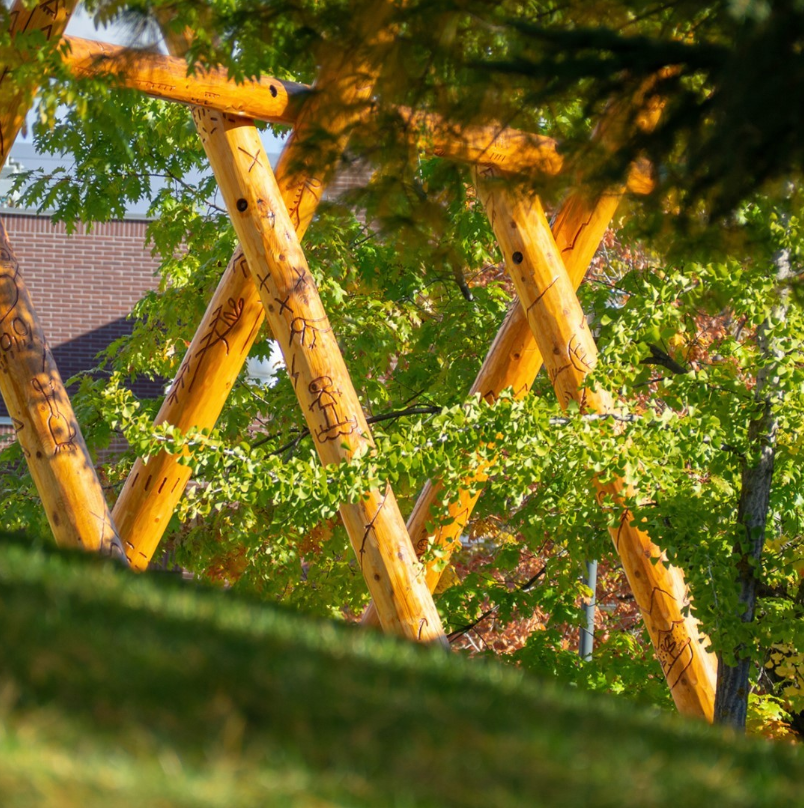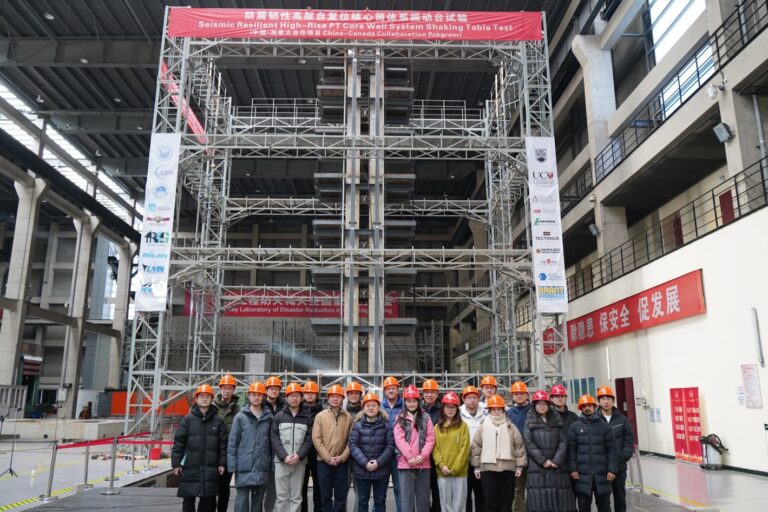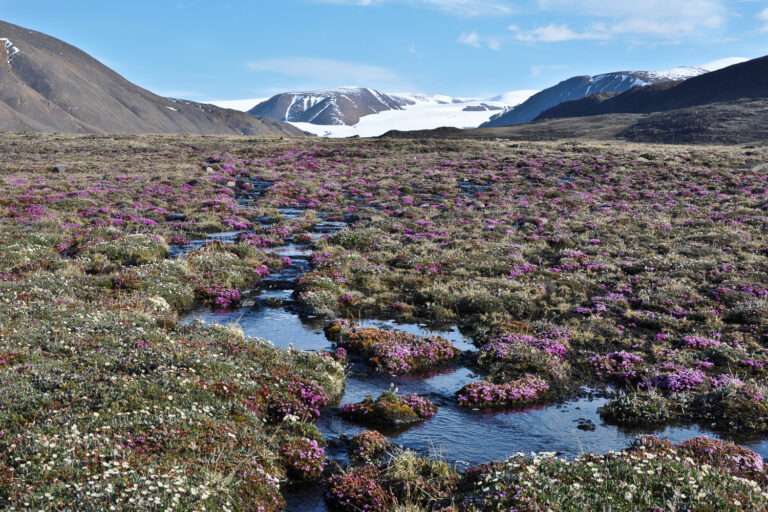Multiple Indigenous-focused initiatives receive UBC funding to help advance rights of Indigenous peoples

sʔi:ɬqəy̓ qeqən (Double-Headed Serpent Post), Brent Sparrow Jr., Musqueam, UBC Vancouver Campus. Photo credit: Hover Collective / UBC Brand & Marketing
A diverse range of Indigenous-focused projects will receive a significant funding boost this month to help transform innovative and impactful ideas into reality. Through the Indigenous Strategic Initiatives Fund (ISI Fund), UBC has committed a total of $4 million this academic year to helping advance the rights of Indigenous peoples as well as the crucial journey towards meaningful reconciliation.
The ISI Fund is a cross-campus initiative at the UBC Vancouver and UBC Okanagan campuses that directly supports the implementation of the UBC Indigenous Strategic Plan (ISP). The announcement of successfully funded initiatives coincides with the two-year anniversary of UBC’s ISP launch.
There are three funding streams: Innovative (Stream One), Transformative (Stream Two) and Student-led (Stream Three), the latter being announced last month. Successful Stream One Innovative projects will receive between $30,000 – $100,000 for one or two years. Successful Stream Two Transformative projects will receive between $50,000 – $250,000 for one to three years. The initiatives have been developed by faculty, staff and post-doctoral students/fellows at the UBC Vancouver and UBC Okanagan campuses and many involve collaborations with community partners. Of the 30 projects granted funding, examples include:
- Advancing the Faculty of Medicine’s response to the Truth and Reconciliation Commission’s (TRC) Calls to Action and its strategic plan. Redressing the harms of colonialism and Indigenous racism in health care and research spaces by bringing together young Indigenous scholars and health care providers, First Nations and Indigenous leadership, experts in anti-racism and Indigenous rights, Elders, knowledge holders, Indigenous faculty and staff
- Creating systemic change for Indigenous students through increasing awareness and knowledge of how colonization impacts campus counselling systems
- Improving health outcomes for Indigenous Peoples across Canada through nursing, via a cross-university partnership
- Establishing a self-sustainable micro-forest on the UBC Okanagan campus, guided by traditional ecological knowledge
- Supporting the Vuntut Gwitchin First Nation meet ambitious climate emissions targets through learning about respectful and reciprocal partnerships pertaining to Indigenous-led climate action
- Developing new platforms for reciprocal training between Musqueam (xwməθkwəy̓əm) Indian Band and the UBC Laboratory of Archeology to improve employment opportunities in the cultural resource management sector
“We are thrilled to see these innovative and transformative projects be awarded funding that will help the project teams bring their ideas to life,” says Dr. Sheryl Lightfoot, senior advisor to the president on Indigenous Affairs, Canada Research Chair of Global Indigenous Rights and Politics, and associate professor in political science and the UBC school of public policy and global affairs.
“We’re extremely encouraged by the thoughtful, collaborative and meaningful initiatives that have been submitted this year, from all corners of both campuses. This paves the way for future years where we hope to see even more cross-campus and cross-faculty collaborations that will have a crucial impact on our communities, both within UBC and beyond,” adds Dr. Lightfoot.
In its inaugural year, this year’s ISI Fund amalgamated two years of funding for a total of $4 million. Next year’s ISI Fund, and subsequent funding cycles, will offer $2 million. In addition to the three main streams, there is a one-time-only Special Fund created to fund graduate research, temporarily filling an unmet need associated with the unique costs of Indigenous community-based research.
Applicants of the Innovative and Transformative funding streams had to follow a two-step process, providing a letter of intent for adjudication, followed by submitting a proposal for further adjudication. Adjudication committees included Indigenous and non-Indigenous adjudicators from both UBC Vancouver and UBC Okanagan. Over 80 per cent of ISI Fund adjudicators self-identified as Indigenous peoples, with strong representation from B.C. First Nations.
The ISI Fund directly supports implementation of projects and initiatives that advance the eight goals and 43 actions of the UBC Indigenous Strategic Plan. Its advancement has been underway for two years through the ISP Guiding Network, an innovative, networked and Indigenous human-rights based model for implementation. The ISP is the result of more than 2,500 unique engagements and over 15,000 ideas, opinions and comments shared by Indigenous and non-Indigenous individuals across both campuses and Indigenous community partners.
The ISI Funding Call was designed and developed with engagement across UBC and final decisions on the guidelines were made by the Indigenous Strategic Plan Executive Advisory Committee (ISPEAC) and supported by the Indigenous Strategic Plan Coordinating Committee (ISPCC).
The Office of Indigenous Strategic Initiatives (OISI) was created in February 2021 to coordinate and support the implementation of the Indigenous Strategic Plan across the Vancouver and Okanagan campuses. The OISI is led by Dr. Lightfoot. Over the past year and a half, the OISI team, together with the ISP Executive Advisory Committee, has developed and administered the inaugural ISI Fund.

Quick links
- More information on the ISI Fund and the successful innovative and transformative projects can be found here
- Read the UBC Indigenous Strategic Plan here
Quotes
Prof. Santa J. Ono, UBC President and Vice-Chancellor
“The high number of funding requests received in this inaugural year reflect the UBC community’s commitment to doing more and doing better when it comes to Indigenous peoples’ human rights and meaningful reconciliation. I would like to thank all the students, faculty and staff – especially the Indigenous members of the community – across both campuses for all their dedicated time and energy committed to the ISI Fund.”
Dr. Lesley Cormack, Deputy Vice-Chancellor and Principal of UBC’s Okanagan campus
“The Indigenous Strategic Plan, along with UBC Okanagan’s Declaration of Truth and Reconciliation Commitments, provides a critical framework to advance the rights of Indigenous peoples as well as the essential work towards understanding truth and meaningful reconciliation. The Indigenous Strategic Initiatives funding supports the efforts of our students, faculty and staff to act and work with community partners on tangible steps forward on the path of reconciliation.”
Adrienne Vedan, Senior Advisor to the Deputy Vice-Chancellor on Indigenous Affairs, UBC Okanagan
“This funding is an important source of support for Indigenous students and faculty and demonstrates a genuine investment by UBC into reconciliation. It creates opportunities for initiatives that make a meaningful impact here in the Okanagan and that furthers the interests of the communities that have been at the heart of the campus since its creation.”
Vicki Lynne George, Associate Director, Office of Indigenous Strategic Initiatives
“It has been crucial that the Indigenous Strategic Plan and Indigenous Strategic Initiatives Fund have been Indigenous led – this is a perfect example of meaningful reconciliation. What is exciting and innovative about the Indigenous Strategic Initiatives Fund is that it directly implements the ISP’s eight goals and 43 actions via the ISI Fund’s eligibility component. As with the ISP, the ISI Fund is cross-campus and it has been delightful to see the collaborations and connections between both campuses.”
Dr. Gage Averill, Provost and Vice-President, Academic, pro tem, UBC Vancouver
“The ISI Fund attracted budget requests totalling $8,657,689 across the three funding streams. And in the first funding cycle, a total of 87 applications were received from the Vancouver and Okanagan campuses. These numbers demonstrate both the importance of this funding and the incredible potential for the university to harness, not just this year but for future years to come.”
Dr. Rehan Sadiq, Provost and Vice-President Academic, pro tem, UBC Okanagan
“The ISI Fund projects demonstrates the action and commitment of the entire UBC community to support the rights of Indigenous peoples, and advance the mission of UBC’s Indigenous Strategic Plan. Through each of these innovative and inspiring projects, UBC expresses our collective dedication to strengthening our relationships with Indigenous community and partners, and building a culture of respect and unity at our university.”
Project lead quotes
Dianne Newell, Professor Emerita and Interim Director of the Centre for Indigenous Fisheries at the Institute for the Oceans and Fisheries, Faculty of Science, UBC Vancouver
“Currently, we are known as a new, exciting centre with promise but through sustaining these and other activities, we hope to become known for the positive changes we make with our partners that sincerely benefit fish, people and place.”
Margaret Kovach, Professor, Department of Educational Studies, Faculty of Education, UBC Vancouver
“Indigenous graduate student peer commitment is the heartbeat of SAGE. Over the next two years, our project will create ripples of impact. Through conducting a SAGE study, our team will gain insight into why programs such as SAGE make a difference in Indigenous graduate student lives.”
Alon Eisenstein, Assistant Professor of Teaching, School of Engineering, Faculty of Applied Science, UBC Okanagan
Project: UBC Okanagan Indigenous microforest
“The educational and research activities that the Indigenous micro-forest will foster will enable and support research opportunities where students learn about Indigenous knowledge systems to become global leaders in their advancement, specifically as they relate to environmental sciences and Indigenous languages.”
Camilla Speller, Associate Professor, Department of Anthropology, Faculty of Arts, UBC Vancouver
Project: Developing new platforms for reciprocal training between Musqueam (xwməθkwəy̓əm) Indian Band (MIB) and the Laboratory of Archaeology (LOA)
“The University has an opportunity to consider and address issues of access to programs and new forms of accreditation that are informed by First Nations and that meet the needs of Indigenous communities. In order to amplify Indigenous voices and perspectives and centre Indigenous ways of knowing, the field school will be jointly delivered by a Musqueam Archaeology Office sessional instructor and a UBC Anthropology faculty member – an exciting opportunity to further Indigenize UBC’s curriculum while providing new pathways for course-credit for Indigenous archaeologists participating in the field school.”
Interview language: English



